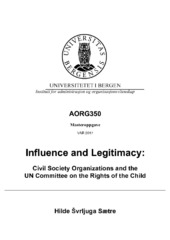| dc.description.abstract | The Committee on the Rights of the Child (CRC) is a UN Treaty body with the mandate to assess the State parties’ adherence to the Convention on the Rights of the Child. This assessment is carried out in a periodic reporting process, where the CRC receives information about the states’ adherence from the State parties themselves, as well as from national civil society organizations (CSOs). The periodic reporting process is finalized when the CRC submits its concluding observations to the State party – a political document both measuring and affecting how states interpret the Convention. CSOs are recognized for enhancing the transparency of international processes such as the one in question, and to make them accessible to the wider public. Hence, the CRC and its reporting process makes for a good case to investigate CSO-influence and -participation. The aim of this thesis is twofold. First, it analyzes how and to what extent CSOs can influence the CRC and its concluding observations, which is demonstrated by way of CSOs from Norway, Finland, and Spain. Secondly, and given the implications, the concluding observations have for a nation state, this thesis also seeks to critically analyze the legitimacy of the CSOs’ role in the periodic reporting process. The findings stem from conducted interviews with a series of CRC and CSO members, and representatives of the UN Secretariat and Child Rights Connect. Furthermore, a linguistically rooted content analysis has been undertaken of the CSOs’ alternative reports in relation to the CRC’s concluding observations. Four power theories and deliberative-normative theory have been employed to analyze the findings. The study identifies means outside and during the reporting process by which the CSOs can influence the CRC and its concluding observations. Moreover, the study demonstrates that 21-54% of the content of the CSOs’ alternative reports have been taken up by the CRC in its concluding observations. Finally, the study concludes that the role of the CSOs in the reporting process may be considered legitimate, yet certain issues fall short of meeting with the deliberative- normative theory in full. | en_US |
